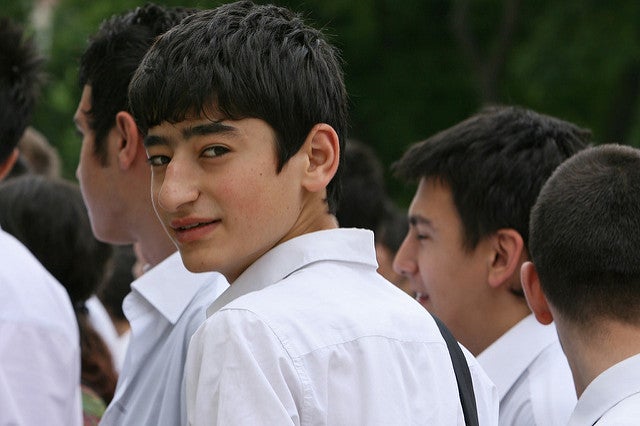
Twenty-four-year-old Narmina enrolled at the Azerbaijan University of Languages in September of 2012. In the last year of Narmina’s studies, her father, a war veteran, and mother encountered financial difficulties and were unable to pay Narmina’s tuition. Having dropped out or, more accurately, “stopped out” of her studies, Narmina applied to Azerbaijan’s newly established Maarifci Student Loan Foundation (MSLF) and was one of the first to be awarded a student loan. With the much needed financial support, Narmina has since completed her bachelor’s degree and now works at a local tourism company.
Developed in response to recent, macro-economic changes in Azerbaijan, the program from which Narmina benefited, the MSLF, is a small student loan program that has a huge impact on its recipients. After many years of remarkable growth, Azerbaijan’s economy is enduring a slowdown brought about by depressed oil prices, weakened trading partners, a rapid devaluation of its currency, and associated inflationary pressures.According to Naveed Naqvi, Country Manager of Azerbaijan, “ In response to the slowdown, the Ministry of Education requested the World Bank’s assistance to help quickly design an innovative student loan pilot program with the MSLF. The Bank identified specific, technical considerations for the design and implementation of the new pilot with examples from other countries and offered future considerations for the loan scheme.”
For the 2014-15 academic year, 62 percent of students at higher education institutions (HEIs) paid tuition for their studies, as opposed to the 38 percent who receive government funding for their higher education. Interviews with different universities suggested a recent increase in the number of low-income students expressing concerns about their ability to pay tuition. Some universities even reported having established informal installment plans (i.e., students pay prorated tuition fees on a monthly basis) or deferred tuition fee payment plans (i.e., students pay tuition at the end of the academic year).
Innovation
To form this student loan program, 10 HEIs formed the Marrifci Student Loan Foundation, in collaboration with the Ministry of Education. Each of the HEIs pledged a small number of study places at their respective institution as an in-kind contribution. The HEIs felt as if the marginal cost of adding a small number of students could be absorbed in the initial years, and, in reality, most of these HEIs were already allowing some low-income students to defer their tuition payment. These volunteered study places, which effectively served as capital to be loaned by the MSLF, were then awarded to students formally as student loans.
Selection was based on the following criteria: being a citizen of the Republic of Azerbaijan; pursuing a bachelor’s degree in day classes at one of the founding HEIs or partner HEIs; being in real need for financial assistance to continue education; having a family annual income level below 10,000 AZN/5,934 USD per year); being an upperclassman with GPA for the previous years at 71 percent or higher; and having no default on loans previously taken by students or their parents.
The standard loan, which does not require collateral or a guarantor, is currently structured on fixed-schedule (or mortgage-style) with a 5-year repayment period and interest rate of 8 percent. After graduation, the student has a one-year grace period before beginning repayment of the accumulated tuition plus interest to the Foundation. A student can borrow up to the equivalent of 2,373 USD per year with a maximum debt ceiling of 11,869 USD per student. After two application sessions, the MSLF’s pilot program has signed student loan contracts with 90 students from 14 universities in the total amount of 108,710 USD.
Though still very much in its infancy, Azerbaijan’s approach to establishing a new student loan scheme is quite innovative and provided a just-in-time response to the country’s economic conditions. The pilot approach deserves recognition for the following advantages:
- Capitalizing the student loan scheme through in-kind contributions from HEIs eliminate necessity of upfront investment from government or private sources;
- Initial loan maintenance costs, including any subsidies, for the Foundation are relatively low since in-kind contributions eliminated the need to finance the spread between the interest rate to be paid by the student borrower and the cost of the borrowed funds; and
- Risk is mitigated by targeting students in their second, third or fourth year who have demonstrated some degree of academic success and appear well suited for the labor market.
Next Steps
The World Bank, Azerbaijan’s Ministry of Education, and the MSLF hosted a workshop to discuss and articulate a vision for the future development of the student loan program. As a result of this workshop, a strategy paper for 2017-2020 is now under development in consultation with Ministry of Education, Ministry of Finance, World Bank, universities, and other key stakeholders.
While the existing model of relying on higher education institutions to donate study places was extremely effective for launching the pilot program quickly, the loan program is now revising its approach as it scales up. In the emerging strategy, strong consideration is being given to the development of an income-contingent repayment option. The MSLF is also exploring ways to enable support for first-year students, a higher risk population, and to develop a loan risk rating system to balance the risk profile of the overall student loan portfolio. Additionally, the MSLF is fundraising to attract additional resources for the loan scheme and developing scholarship programs with involvement of private businesses.
The Minister of Education and the Chair of Parliament’s Committee on Education and Science praised the launch of the MSLF as an exciting first step to Azerbaijan providing student loans.
With additional political and financial support, a whole generation of Narminas will have a better chance at higher education.
Find out more about World Bank Group Education on our website and on Twitter . See all our resources on higher education.


Join the Conversation